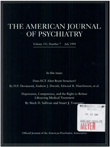Prediction of outcome in mania by mood-congruent or mood-incongruent psychotic features
Abstract
OBJECTIVE: The aim of this study was to determine the significance of mood congruence of psychotic features in mania as a predictor of outcome. METHOD: Fifty-four patients with bipolar disorder were followed prospectively for 4 years after recovery from an episode of mania with psychotic features. Assessments of residential and occupational status, interepisode symptoms, and episode recurrences were made at 6 and 48 months after recovery. Categorical outcomes were evaluated by logistic regression and recurrence risk with survival analysis. RESULTS: Mood-incongruent psychotic features during the index manic episode predicted a shorter time in remission at 4 years (hazard ratio = 2.6), and Schneiderian first-rank symptoms predicted poor residential status at 4 years (odds ratio = 20.1). CONCLUSIONS: Differentiation of mood congruence of psychotic features in mania evidently has prognostic validity and, therefore, has utility as a nosological characteristic.
Access content
To read the fulltext, please use one of the options below to sign in or purchase access.- Personal login
- Institutional Login
- Sign in via OpenAthens
- Register for access
-
Please login/register if you wish to pair your device and check access availability.
Not a subscriber?
PsychiatryOnline subscription options offer access to the DSM-5 library, books, journals, CME, and patient resources. This all-in-one virtual library provides psychiatrists and mental health professionals with key resources for diagnosis, treatment, research, and professional development.
Need more help? PsychiatryOnline Customer Service may be reached by emailing [email protected] or by calling 800-368-5777 (in the U.S.) or 703-907-7322 (outside the U.S.).



